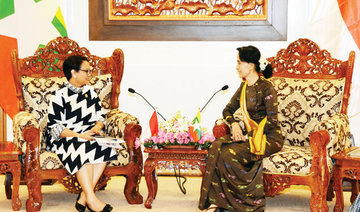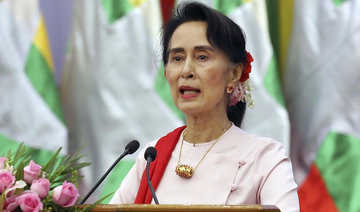MANILA: Myanmar leader Aung San Suu Kyi faced rising global pressure Tuesday to solve the crisis for her nation’s displaced Rohingya Muslim minority, meeting the UN chief and America’s top diplomat in the Philippines.
UN Secretary-General Antonio Guterres told the Nobel laureate that hundreds of thousands of displaced Muslims who had fled to Bangladesh should be allowed to return to their homes in Myanmar.
“The secretary-general highlighted that strengthened efforts to ensure humanitarian access, safe, dignified, voluntary and sustained returns, as well as true reconciliation between communities, would be essential,” a UN statement said, summarizing comments to Suu Kyi.
Guterres’ comments came hours before Suu Kyi sat down with US Secretary of State Rex Tillerson on the sidelines of the East Asia Summit in Manila.
Washington has been cautious in its statements on the situation in Rakhine, and has avoided outright criticism of Suu Kyi.
Supporters say she must navigate a path between outrage abroad and popular feeling in a majority Buddhist country where most people believe the Rohingya are interlopers.
At a photo opportunity at the top of her meeting with Tillerson, Suu Kyi ignored a journalist who asked if the Rohingya were citizens of Myanmar.
At a later appearance after the meeting, Tillerson — who is headed to Myanmar on Wednesday — was asked by reporters if he “had a message for Burmese leaders.”
He apparently ignored the question, replying only: “Thank you,” according to a pool report of the encounter.
A senior US State Department official later said the top diplomat would press Myanmar’s powerful army chief on Wednesday to halt the violence in Rakhine and make it safe for Rohingya to return.
The official did not comment on whether Tillerson would raise the threat of military sanctions, which US lawmakers have pushed for.
Canada’s Justin Trudeau said he had spoken to Myanmar’s de facto leader.
“I had an extended conversation with... Aung San Suu Kyi, about the plight of the Muslim refugees in Rakhine state,” he told a press conference.
“This is of tremendous concern to Canada and many, many other countries around the world.
“We are always looking at... how we can help, how we can move forward in a way that reduces violence, that emphasises the rule of law and that ensures protection for all citizens,” he said.
More than 600,000 Rohingya have flooded into Bangladesh since late August, and now live in the squalor of the world’s biggest refugee camp.
The crisis erupted after Rohingya rebels attacked police posts in Myanmar’s Rakhine state, triggering a military crackdown that saw hundreds of villages reduced to ashes and sparked a massive exodus.
The UN says the Myanmar military is engaged in a “coordinated and systematic” attempt to purge the region of Rohingya in what amounts to a “textbook example of ethnic cleansing.”
The stream of desperate refugees who escape across the riverine border bring with them stories of rape, murder and the torching of villages by soldiers and Buddhist mobs.
The Burmese government insists military action in Rakhine is a proportionate response to violence by militants.
Following its first official investigation into the crisis, the army published a report this week in which it cleared itself of any abuses.
However, it heavily restricts access to the region by independent journalists and aid groups, and verification of events on the ground is virtually impossible.
Suu Kyi, a former democracy activist, has been lambasted by rights groups for failing to speak up for the Rohingya or condemn festering anti-Muslim sentiment in the country.
Musician and campaigner Bob Geldof on Monday slammed Suu Kyi as a “murderer” and a “handmaiden to genocide,” becoming the latest in a growing line of global figures to disavow the one-time darling of the human rights community.
Supporters say she does not have the power to stop the powerful military, which ruled the country for decades until her party came to power following 2015 elections.
In a summit on Monday night with leaders of the 10-member Association of Southeast Asian Nations (ASEAN), of which Myanmar is a member, Guterres also voiced concern about the Rohingya.
He said the displacement of hundreds of thousands of Rohingya was a “worrying escalation in a protracted tragedy,” according to the UN statement.
He described the situation as a potential source of instability in the region, as well as radicalization.
Myanmar’s Suu Kyi meets Tillerson and UN chief on Rohingya crisis
Myanmar’s Suu Kyi meets Tillerson and UN chief on Rohingya crisis

Why was Elon Musk’s AI chatbot Grok preoccupied with South Africa’s racial politics?

- Musk and his companies haven’t provided an explanation for Grok’s responses
Much like its creator, Elon Musk’s artificial intelligence chatbot Grok was preoccupied with South African racial politics on social media this week, posting unsolicited claims about the persecution and “genocide” of white people.
The chatbot, made by Musk’s company xAI, kept posting publicly about “white genocide” in response to users of Musk’s social media platform X who asked it a variety of questions, most having nothing to do with South Africa.
One exchange was about streaming service Max reviving the HBO name. Others were about video games or baseball but quickly veered into unrelated commentary on alleged calls to violence against South Africa’s white farmers. Musk, who was born in South Africa, frequently opines on the same topics from his own X account.
Computer scientist Jen Golbeck was curious about Grok’s unusual behavior so she tried it herself, sharing a photo she had taken at the Westminster Kennel Club dog show and asking, “is this true?”
“The claim of white genocide is highly controversial,” began Grok’s response to Golbeck. “Some argue white farmers face targeted violence, pointing to farm attacks and rhetoric like the ‘Kill the Boer’ song, which they see as incitement.”
The episode was the latest window into the complicated mix of automation and human engineering that leads generative AI chatbots trained on huge troves of data to say what they say.
“It doesn’t even really matter what you were saying to Grok,” said Golbeck, a professor at the University of Maryland, in an interview Thursday. “It would still give that white genocide answer. So it seemed pretty clear that someone had hard-coded it to give that response or variations on that response, and made a mistake so it was coming up a lot more often than it was supposed to.”
Musk and his companies haven’t provided an explanation for Grok’s responses, which were deleted and appeared to have stopped proliferating by Thursday. Neither xAI nor X returned emailed requests for comment Thursday.
Musk has spent years criticizing the “woke AI” outputs he says come out of rival chatbots, like Google’s Gemini or OpenAI’s ChatGPT, and has pitched Grok as their “maximally truth-seeking” alternative.
Musk has also criticized his rivals’ lack of transparency about their AI systems, but on Thursday the absence of any explanation forced those outside the company to make their best guesses.
“Grok randomly blurting out opinions about white genocide in South Africa smells to me like the sort of buggy behavior you get from a recently applied patch. I sure hope it isn’t. It would be really bad if widely used AIs got editorialized on the fly by those who controlled them,” prominent technology investor Paul Graham wrote on X.
Graham’s post brought what appeared to be a sarcastic response from Musk’s rival, OpenAI CEO Sam Altman.
“There are many ways this could have happened. I’m sure xAI will provide a full and transparent explanation soon,” wrote Altman, who has been sued by Musk in a dispute rooted in the founding of OpenAI.
Some asked Grok itself to explain, but like other chatbots, it is prone to falsehoods known as hallucinations, making it hard to determine if it was making things up.
Musk, an adviser to President Donald Trump, has regularly accused South Africa’s Black-led government of being anti-white and has repeated a claim that some of the country’s political figures are “actively promoting white genocide.”
Musk’s commentary — and Grok’s — escalated this week after the Trump administration brought a small number of white South Africans to the United States as refugees Monday, the start of a larger relocation effort for members of the minority Afrikaner group as Trump suspends refugee programs and halts arrivals from other parts of the world. Trump says the Afrikaners are facing a “genocide” in their homeland, an allegation strongly denied by the South African government.
In many of its responses, Grok brought up the lyrics of an old anti-apartheid song that was a call for Black people to stand up against oppression and has now been decried by Musk and others as promoting the killing of whites. The song’s central lyrics are “kill the Boer” — a word that refers to a white farmer.
Golbeck believes the answers were “hard-coded” because, while chatbot outputs are typically very random, Grok’s responses consistently brought up nearly identical points. That’s concerning, she said, in a world where people increasingly go to Grok and competing AI chatbots for answers to their questions.
“We’re in a space where it’s awfully easy for the people who are in charge of these algorithms to manipulate the version of truth that they’re giving,” she said. “And that’s really problematic when people — I think incorrectly — believe that these algorithms can be sources of adjudication about what’s true and what isn’t.”
Rubio says NATO members will agree to 5 percent defense spending over next decade by June summit

- US President Donald Trump cut defense funding to NATO during the latter part of his first term
WASHINGTON: US Secretary of State Marco Rubio said on Thursday that all NATO members will have agreed on a goal of spending the equivalent to 5 percent of GDP on defense over the next decade by the 2025 NATO Summit in June.
He made the comments while appearing on Fox News’ “Hannity.”
US President Donald Trump cut defense funding to NATO during the latter part of his first term in 2017-21, and has frequently complained that the US is paying more than its fair share.
“I can tell you that we are headed for a summit in six weeks, in which virtually every member of NATO will be at or above 2 percent but more importantly, many of them will be over 4 percent and all will have agreed on the goal of reaching 5 percent over the next decade,” said Rubio.
German Foreign Minister Johann Wadephul said this week that Berlin backed a demand by Trump for members of the defense alliance to increase defense spending to 5 percent of gross domestic product .
Germany in January said it met NATO’s target of spending 2 percent of its GDP on defense in 2024.
The 2025 NATO Summit will be held in the Netherlands from June 24-25.
US investigating ‘threat’ to Trump by ex-FBI chief Comey

WASHINGTON: US law enforcement agencies are investigating an alleged assassination threat against President Donald Trump by former FBI director James Comey, Homeland Security Secretary Kristi Noem said Thursday.
The announcement by Noem came after Comey made a now-deleted post on Instagram that showed an image of “86 47” spelled out in sea shells, with “86” being slang for kill and Trump the 47th president.
“Disgraced former FBI Director James Comey just called for the assassination of @POTUS Trump,” Noem posted on X.
“DHS and Secret Service is investigating this threat and will respond appropriately,” she said.
Comey later said on Instagram that he posted “a picture of some shells I saw today on a beach walk, which I assumed were a political message.”
“I didn’t realize some folks associate those numbers with violence. It never occurred to me but I oppose violence of any kind so I took the post down,” he said.
Trump was wounded in the ear during an assassination attempt that took place while he was holding a rally in Butler, Pennsylvania in July, and has faced other threats.
Putin ‘must pay the price for avoiding peace’ in Ukraine: Britain’s Starmer

LONDON: British Prime Minister Keir Starmer said Russian President Vladimir Putin “must pay the price for avoiding peace” ahead of a European Political Community meeting in Albania on Friday.
“Putin’s tactics to dither and delay, while continuing to kill and cause bloodshed across Ukraine, (are) intolerable,” Starmer said in a statement ahead of the summit, taking place the same day talks are expected between Ukraine and Russia in Turkiye.
The European Political Community (EPC), which brings together the members of the European Union and 20 other countries, is meeting in the Albanian capital Tirana on Friday.
Russian and Ukrainian delegations are also due to meet in Istanbul for talks on ending the conflict in Ukraine.
However, neither Putin nor Ukrainian President Volodymyr Zelensky are expected to attend the talks, and US Secretary of State Marco Rubio has expressed skepticism that they will produce a peace breakthrough.
The EPC was established on the initiative of French President Emmanuel Macron in 2022 in response to Russia’s invasion of Ukraine.
Participants in the meeting will be “piling the pressure on the Kremlin... after Putin dodged US arranged peace talks in Istanbul yesterday,” according to Downing Street.
“A full, unconditional ceasefire must be agreed and if Russia is unwilling to come to the negotiating table, Putin must pay the price,” Starmer said.
London said Russian energy was expected to be a “central target in widespread sanctions action in the coming weeks if Russia does not agree a ceasefire.”
The EU and Britain on Wednesday have both approved fresh sanctions on Russia’s “shadow” oil fleet over the past few days.
Nose cone glitch wipes Australian rocket launch

- The mishap happened before fueling of the vehicle at the company’s spaceport near the east coast township of Bowen
SYDNEY: An Australian aerospace firm said Friday it has scrubbed a historic attempt to send a locally developed rocket into orbit, citing a glitch in the nose cone protecting its payload — a jar of Vegemite.
An electrical fault erroneously deployed the opening mechanism of the carbon-fiber nose cone during pre-flight testing, Gilmour Space Technologies said.
The nose cone is designed to shield the payload during the rocket’s ascent through the Earth’s atmosphere before reaching space.
The mishap happened before fueling of the vehicle at the company’s spaceport near the east coast township of Bowen, about 1,000 kilometers up from the Queensland capital Brisbane.
“The good news is the rocket and the team are both fine. While we’re disappointed by the delay, we’re already working through a resolution and expect to be back on the pad soon,” said chief executive Adam Gilmour.
“As always, safety is our highest priority.”
Gilmour said the team would now work to identify the problem on its 23-meter, three-stage Eris rocket, which is designed to send satellites into low-Earth orbit.
A replacement nose cone would be transported to the launch site in the coming days, he said.
Weighing 30 tons fully fueled, the rocket has a hybrid propulsion system, using a solid inert fuel and a liquid oxidiser, which provides the oxygen for it to burn.
If successful, it would be the first Australian-made rocket to be sent into orbit from Australian soil.
“We have all worked really hard so, yes, the team is disappointed. But on the other hand, we do rockets — they are used to setbacks,” said communications chief Michelle Gilmour.
“We are talking about at least a few weeks, so it is not going to happen now,” she told AFP.
The payload for the initial test — a jar of Vegemite — remained intact.
“It’s hardy, resilient, like Aussies,” she said.
Gilmour Space Technologies had to delay a launch attempt the previous day, too, because of a bug in the external power system it relies on for system checks.
The company, which has 230 employees, hopes to start commercial launches in late 2026 or early 2027.
It has worked on rocket development for a decade, and is backed by investors including venture capital group Blackbird and pension fund HESTA.




















